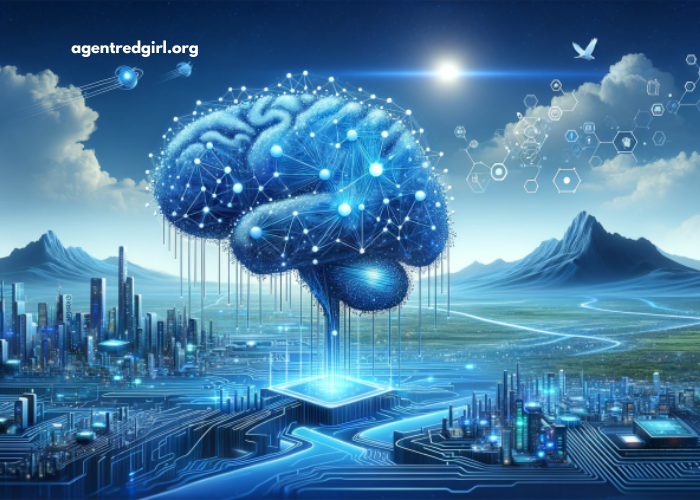The future of technology holds immense potential to redefine the way we live, work, and interact with the world. As advancements in technology continue to progress at an unprecedented rate, it is reshaping industries, driving economic growth, and influencing global social structures. From artificial intelligence (AI) and machine learning to the internet of things (IoT) and quantum computing, the coming technological innovations are poised to transform every aspect of human life. In this article, we explore how the future of technology is driving global progress and what it means for businesses, governments, and individuals alike.
The Impact of Emerging Technologies on Global Economies
The future of technology is closely linked to global economic growth. As new technologies emerge, they create new markets, opportunities, and industries, boosting productivity and driving economic advancement. The digital transformation of businesses, along with the integration of automation, AI, and robotics, is enabling companies to enhance operational efficiency, reduce costs, and deliver better products and services.
Artificial Intelligence and Machine Learning
AI and machine learning are among the most significant technological advances shaping the future. These technologies are already revolutionizing industries, from healthcare and finance to manufacturing and transportation. AI systems can process vast amounts of data quickly and accurately, making it possible for businesses to gain actionable insights and make informed decisions.
Machine learning, a subset of AI, enables systems to improve and learn from experience, making them increasingly efficient over time. For example, in healthcare, AI-powered tools can diagnose diseases more accurately than traditional methods, while in finance, machine learning algorithms can predict market trends and help investors optimize their portfolios.
In the coming years, AI and machine learning are expected to play an even greater role in shaping global economies. These technologies will drive innovation, improve productivity, and help businesses create personalized experiences for customers, ultimately contributing to economic growth on a global scale.
The Internet of Things (IoT)
The Internet of Things refers to the growing network of interconnected devices that communicate with each other through the internet. These devices can range from smart home appliances and wearables to industrial machines and sensors. The IoT enables the collection and exchange of data in real-time, offering businesses and individuals new opportunities to optimize their daily operations.
In the manufacturing sector, for instance, IoT devices allow companies to monitor equipment performance, predict maintenance needs, and reduce downtime. Similarly, in agriculture, IoT-enabled sensors can track soil moisture levels, monitor crop health, and optimize irrigation systems, leading to higher crop yields and more sustainable farming practices.
As IoT technology continues to evolve, it will drive greater efficiency and innovation across industries, contributing to global economic progress. The widespread adoption of IoT devices will also open up new opportunities for entrepreneurship and job creation, further fueling economic growth.
Advancements in Healthcare: Improving Lives and Lifespan
Technology is also playing a pivotal role in transforming the healthcare industry. With advancements in medical technology, AI, and biotechnology, the future of healthcare looks promising. These innovations have the potential to improve the quality of care, increase access to healthcare services, and extend life expectancy.
Telemedicine and Remote Care
One of the most notable trends in healthcare technology is the rise of telemedicine. Telemedicine enables patients to consult with doctors remotely, reducing the need for in-person visits and increasing access to healthcare services, particularly in rural or underserved areas. The COVID-19 pandemic accelerated the adoption of telemedicine, and it is now a staple of modern healthcare delivery.
The future of telemedicine will see even more advanced technologies, such as virtual reality (VR) and augmented reality (AR), being integrated into healthcare practices. These technologies will allow doctors to conduct more accurate remote diagnoses and even perform surgeries with robotic assistance.
Personalized Medicine and Biotechnology
Advancements in genomics and biotechnology are also driving progress in healthcare. Personalized medicine, which tailors treatments to an individual’s genetic makeup, is becoming more accessible thanks to breakthroughs in DNA sequencing and gene-editing technologies like CRISPR. These innovations have the potential to cure previously untreatable diseases and extend human lifespans.
The future of biotechnology holds promise for creating new therapies and medical treatments that can address a wide range of health conditions, from cancer to rare genetic disorders. As biotechnology continues to advance, it will contribute to a healthier global population and improve overall quality of life.
Sustainable Technologies: A Greener Future for the Planet
As concerns about climate change and environmental sustainability grow, technology is increasingly being harnessed to address these challenges. The future of technology will be instrumental in creating sustainable solutions that reduce environmental impact and promote green energy.
Renewable Energy Technologies
Renewable energy technologies, such as solar, wind, and hydroelectric power, are rapidly gaining ground as viable alternatives to fossil fuels. The future of energy generation will see even more efficient and cost-effective renewable energy sources, driven by advancements in materials science, energy storage solutions, and grid integration.
For example, solar panels are becoming more efficient and affordable, while wind turbines are being designed to capture more energy at lower wind speeds. Additionally, advancements in battery technology are making it easier to store renewable energy for use during periods of low generation, such as at night or during cloudy days.
The widespread adoption of renewable energy will help reduce greenhouse gas emissions, combat climate change, and create a more sustainable global energy system. As the world shifts toward cleaner energy sources, new industries and job opportunities will emerge, fostering both environmental and economic progress.
Smart Cities and Urban Sustainability
Another key area where technology is driving global progress is in the development of smart cities. Smart cities use IoT sensors, AI, and data analytics to optimize urban infrastructure, reduce energy consumption, and improve the quality of life for residents.
For example, smart traffic management systems can reduce congestion and air pollution by optimizing traffic flow in real-time. Smart buildings can automatically adjust lighting, heating, and cooling systems to maximize energy efficiency. Additionally, IoT sensors can monitor air quality, water usage, and waste management, helping cities become more sustainable and livable.
The future of smart cities will see even more advanced technologies integrated into urban environments, further improving sustainability and quality of life for city dwellers. As cities become more connected and efficient, they will contribute to global progress by promoting environmental sustainability and enhancing urban living conditions.
The Role of Education and Workforce Development
As technology continues to evolve, so too must the workforce. The future of technology will require workers to possess new skills and adapt to the changing demands of the job market. Education and workforce development will play a crucial role in shaping global progress by ensuring that individuals are equipped with the skills needed to thrive in a technology-driven world.
Digital Literacy and STEM Education
To prepare future generations for the opportunities and challenges presented by emerging technologies, digital literacy and STEM (science, technology, engineering, and mathematics) education will be more important than ever. By fostering a strong foundation in these fields, we can equip individuals with the knowledge and skills to succeed in the digital economy.
Governments, schools, and universities must work together to develop educational programs that promote digital literacy and encourage students to pursue careers in STEM fields. This will help ensure that the workforce is prepared for the technological advancements that are reshaping the global economy.
Reskilling and Upskilling the Workforce
As automation and AI continue to disrupt traditional job roles, reskilling and upskilling will become essential for workers to stay competitive in the job market. Businesses and governments will need to invest in training programs that help workers transition into new roles or acquire new skills that are in high demand.
By providing workers with opportunities to develop new skills and adapt to changing technologies, we can ensure that they remain valuable contributors to the economy. This approach will also help reduce unemployment and income inequality, driving global progress by promoting economic inclusivity and social mobility.
The Ethical Considerations of Technological Advancements
While technology holds the potential to drive global progress, it also raises important ethical questions that must be addressed. As we embrace new technologies, it is crucial to consider their potential impact on society, privacy, and security.
Privacy and Data Protection
One of the most pressing ethical concerns related to technology is the protection of personal data. As more devices become connected to the internet and more data is collected, there is a growing risk of privacy breaches and misuse of personal information. Governments and businesses must work together to establish robust data protection laws and practices that safeguard individuals’ privacy rights.
Artificial Intelligence and Automation
The rise of AI and automation also raises concerns about job displacement and the future of work. While these technologies can increase productivity and efficiency, they also have the potential to replace human workers in certain industries. Policymakers must find ways to balance technological innovation with social welfare, ensuring that workers are not left behind in the transition to a more automated economy.
Conclusion: A Bright Future Driven by Technology
The future of technology is poised to drive significant global progress, from economic growth and healthcare improvements to environmental sustainability and education. As we continue to innovate and adopt new technologies, we must also consider their ethical implications and work to ensure that the benefits of these advancements are shared equitably across society.
By embracing emerging technologies and preparing future generations for the challenges and opportunities they present, we can create a brighter, more sustainable, and prosperous future for all. Technology will undoubtedly shape the course of global progress, and it is up to us to ensure that it is harnessed for the greater good.





